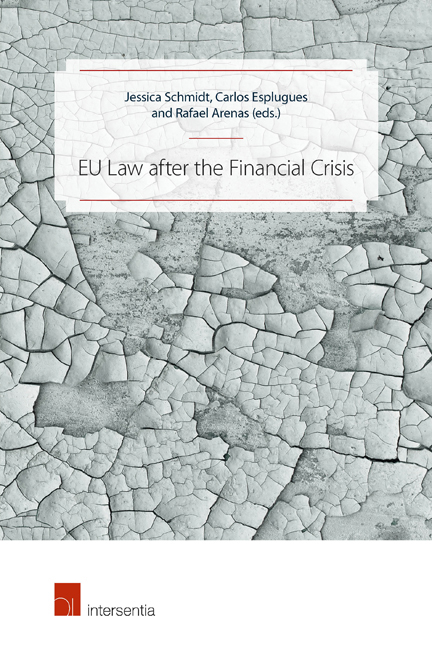Book contents
- Frontmatter
- Contents
- List of Abbreviations
- List of Authors
- Introduction
- PART I RESCUE MECHANISMS AND MONETARY POLICY
- PART II THE IMPACT OF THE FINANCIAL CRISIS ON THE BANKING SECTOR AND CAPITAL MARKETS
- PART III THE FINANCIAL CRISIS AND TAX LAW
- The European Crises as Tax Crises
- A Common Tax Policy for Europe
- PART IV THE FINANCIAL CRISIS, CONSUMERS AND CONSUMER LAW
- PART V THE FINANCIAL CRISIS AND COMPETITION LAW
- PART VI THE FINANCIAL CRISIS, RESTRUCTURING AND INSOLVENCY LAW
- PART VII THE SOCIAL DIMENSION OF THE FINANCIAL CRISIS AND EU CITIZENSHIP
- PART VIII REFLECTIONS ON THE IMPACT OF THE FINANCIAL CRISIS ON THE GENERAL EUROPEAN LEGAL FRAMEWORK AND THE FUNDAMENTAL “EUROPEAN IDEA”
A Common Tax Policy for Europe
from PART III - THE FINANCIAL CRISIS AND TAX LAW
Published online by Cambridge University Press: 13 December 2017
- Frontmatter
- Contents
- List of Abbreviations
- List of Authors
- Introduction
- PART I RESCUE MECHANISMS AND MONETARY POLICY
- PART II THE IMPACT OF THE FINANCIAL CRISIS ON THE BANKING SECTOR AND CAPITAL MARKETS
- PART III THE FINANCIAL CRISIS AND TAX LAW
- The European Crises as Tax Crises
- A Common Tax Policy for Europe
- PART IV THE FINANCIAL CRISIS, CONSUMERS AND CONSUMER LAW
- PART V THE FINANCIAL CRISIS AND COMPETITION LAW
- PART VI THE FINANCIAL CRISIS, RESTRUCTURING AND INSOLVENCY LAW
- PART VII THE SOCIAL DIMENSION OF THE FINANCIAL CRISIS AND EU CITIZENSHIP
- PART VIII REFLECTIONS ON THE IMPACT OF THE FINANCIAL CRISIS ON THE GENERAL EUROPEAN LEGAL FRAMEWORK AND THE FUNDAMENTAL “EUROPEAN IDEA”
Summary
THE LACK OF INTEGRATION IN THE FIELD OF DIRECT TAXATION
When considering a common tax policy for Europe, focus is immediately drawn to the area of direct taxes because indirect taxation, particularly value added tax, is to a large extent already regulated at European level. Due to their relevance for product prices, indirect taxes may create an immediate obstacle to the functioning of the internal market in particular in the form of distortions of competition. Article 113 TFEU therefore provides for the harmonisation of indirect taxation. Indirect taxes also include the financial transaction tax, which is currently under political discussion. It is primarily intended to ensure that financial institutions make a fair contribution to covering the costs of the recent crisis.
In contrast, direct taxes, especially income and corporate taxes, are so far only selectively harmonised by secondary law. They are only of indirect relevance for the formation of prices, so that their importance for the establishment of the internal market appears less pronounced. The tension that exists with the fiscal sovereignty of the Member States is therefore dissolved in favour of the latter in this area. The few existing legal acts essentially deal with selected questions of taxation of cross-border groups. These include, in particular, the Merger Directive, the Parent-Subsidiary Directive and the Interest and Royalties Directive. The relevant provisions mainly aim at avoiding double taxation and in this way complement international taxation law. The integration power of the market freedoms and the following integration efforts set in train by the European Court of Justice are also limited by their natures, primarily because they only cover cross-border issues and solely entail negative integration of limited extent. They “cannot replace comprehensive legislation at EU level”.
Thus, the European Union is not a tax law Union. According to the Treaties, fiscal sovereignty rests with the Member States. Articles 110 ff. TFEU are based on the deliberate decision not to provide the Union with a primary tax competence.
- Type
- Chapter
- Information
- EU Law after the Financial Crisis , pp. 97 - 106Publisher: IntersentiaPrint publication year: 2016



